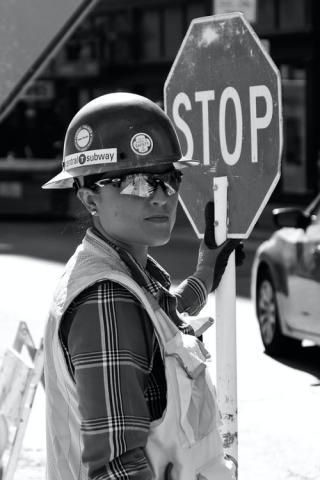"…God weeps for all people abandoned, abused,
God weeps for the women whose bodies are bruised,
God weeps when the gift that God has infused,
is turned from its purpose and brutally used…"
Stanza 2, Hymn "Holy and Good," by Thomas Troeger)
Violence against women is a serious health and social problem worldwide and may result in severe physical and mental health consequences. To raise awareness about gender-based and sexual violence, many students and faculty participated in the annual "Take Back the Night" march through the StFX University campus on 22 October. The aim of the "Take Back the Night" was to ensure that we eliminate sexual violence at the university and in all our communities.
In fact, "Take Back the Night" is the earliest worldwide movement to protest gender-based violence. The phrase "Take Back the night" was reportedly used as the title of a 1977 memorial read by activist Anne Pride at an anti-violence rally in Pittsburgh.
The Take Back the Night (TBTN) Foundation is an international, non-profit organization working to end sexual assault, domestic violence, dating violence, sexual abuse, and all other forms of gender violence.
TBTN events started in the 1960’s in Belgium and England to protest women safety issues. According to reports, in 1973, a group of women at the University of Southern Florida, dressed in black sheets, held broomsticks, and marched through campus demanding a women’s center. In 1975, a crowd in Philadelphia reportedly held a Take Back the Night event to protest the murder of a microbiologist walking home after work. In the 1970s, a number of rallies were reportedly held to protest violence against women.
Every year, hundreds of events are held on college campuses and in communities of all sizes and locations, to bring awareness about sexual violence and provide support for the victims. According to its website, the TBTN Foundation reaches millions of girls and women all over the world. It has also organized events in Australia, New Zealand, Japan, Bermuda, Canada, Italy, Poland, Germany, Hungary, India, England and many other countries. The common purpose is to advocate for the right of everyone to feel safe from sexual violence.
According to the website of UN Women, the United Nations entity dedicated to gender equality and the empowerment of women, 35 per cent of women worldwide have experienced either physical and/or sexual intimate partner violence or sexual violence by a non-partner at some point in their lives. However, some national studies show that up to 70 per cent of women have experienced physical and/or sexual violence from an intimate partner in their lifetime. In the majority of countries with available data, less than 40 per cent of the women who experience violence seek help of any sort, thus clearly highlighting the need for support groups and awareness about them in the society.
According to the WHO, the social and economic costs of sexual violence are enormous and have ripple effects throughout the society. To achieve lasting change, it advocates enacting and enforcing legislation and policies that promote gender equality.
